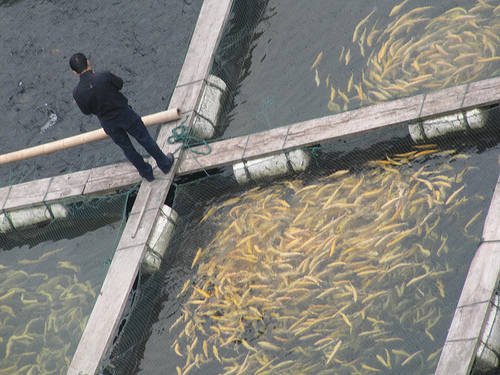 On Friday, the Obama administration took a major step in the long anticipated process of making it easier for commercial aquaculture firms to operate in federal waters. Currently there isn’t any fish farming — the cultivation of everything from bivalves like oysters and mussels to predators like salmon — in federal waters. Only states allow aquaculture within a three-mile band.
On Friday, the Obama administration took a major step in the long anticipated process of making it easier for commercial aquaculture firms to operate in federal waters. Currently there isn’t any fish farming — the cultivation of everything from bivalves like oysters and mussels to predators like salmon — in federal waters. Only states allow aquaculture within a three-mile band.
The major fishery that could be affected by this regulatory step will be the Gulf of Mexico.
Aquaculture now accounts for more than half of fish consumed globally and while governments and environmental groups agree that wild fish stocks are unsustainable in the face of global population set to hit nine billion , there’s very little consensus on how to create environmentally sustainable standards for the expansion of global fish farming.
One thing that is for sure, is that global aquaculture is primed for growth, given the increase in demand for fish protein across the US and from the emerging middle classes in China, India and Brazil.
The move by the National Oceanic and Atmospheric Administration’s Fisheries Service (NOAA) has myriad political, economic and environmental roots. From a socio-economic position, the US has long sought to expand its domestic aquaculture market, which now represents just 1.9% of global farmed fish output. Currently the US has a $9 billion seafood trade deficit with 84% of the fish imported coming from cultivated (e.g., NOT wild) sources.
Many operators have applied to invest in federal waters, but no applications have been approved creating a backlog of transactions in a moment where the US government’s own Department of Agriculture has recommended that Americans eat twice as much fish to support a healthier diet.
Clearly, something has to give. And with the Obama administration desperate to demonstrate a higher level of commitment to job creation before next November, this move has a whisper of politics, but also an impetus of thoughtful pragmatism.
Expanding aquaculture in the US is probably a sage move. If we have more commercial skin in the game, then we can have far greater influence in spreading more robust environmental standards globally. In addition, if the US can differentiate US farm-raised fish by vetting the industry using a more credible environmental standard, there’s an opportunity to grow global market share, protect the environment and improve the health of the American consumer.
Aspirational? Yes of course. Foolhardy? Let’s hope not.
Image credit by IvanWalsh via Flickr under a CC license





